Migration Law | Assessment 1
VerifiedAdded on 2022/10/04
|13
|2476
|31
Assignment
AI Summary
Contribute Materials
Your contribution can guide someone’s learning journey. Share your
documents today.
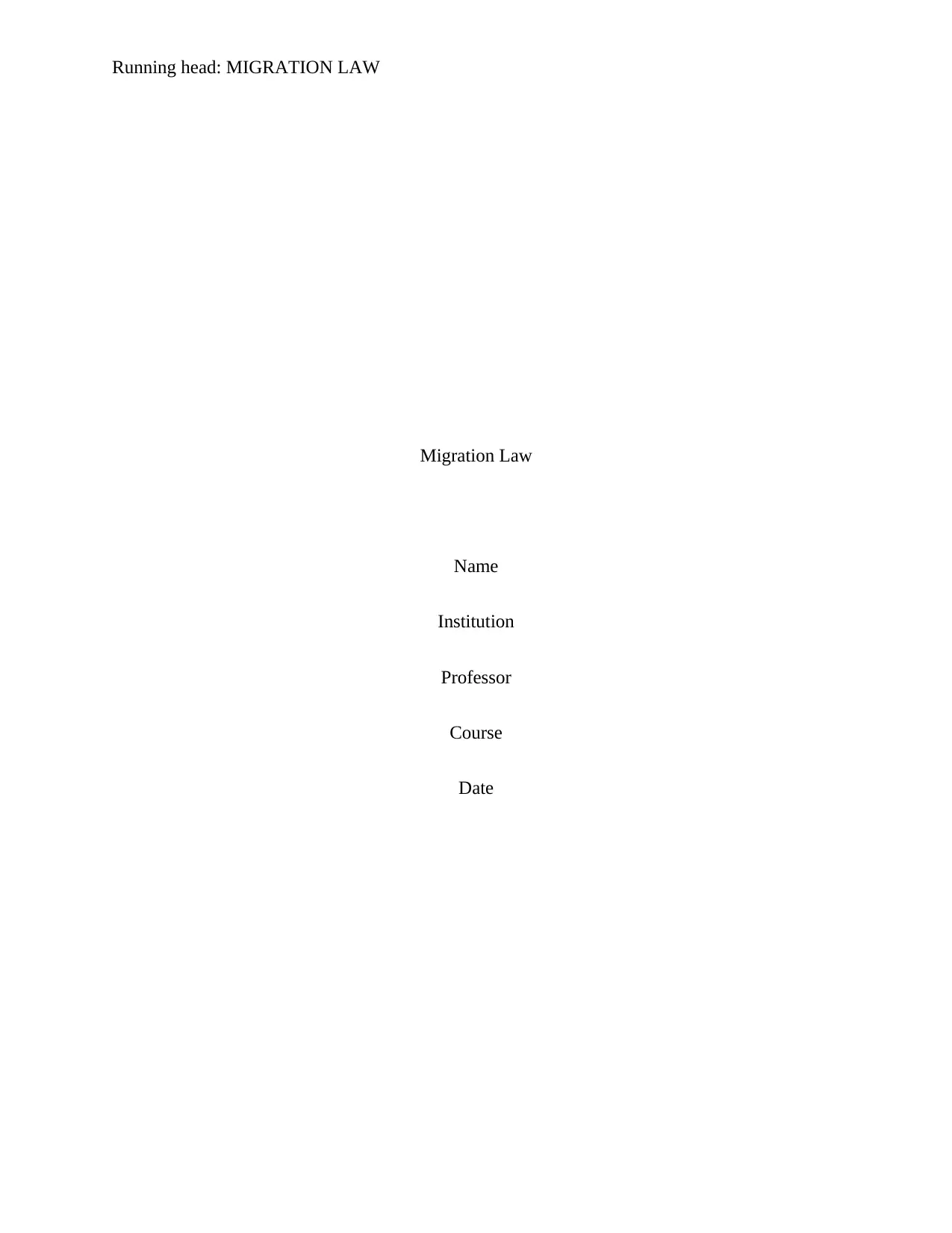
Running head: MIGRATION LAW
Migration Law
Name
Institution
Professor
Course
Date
Migration Law
Name
Institution
Professor
Course
Date
Secure Best Marks with AI Grader
Need help grading? Try our AI Grader for instant feedback on your assignments.
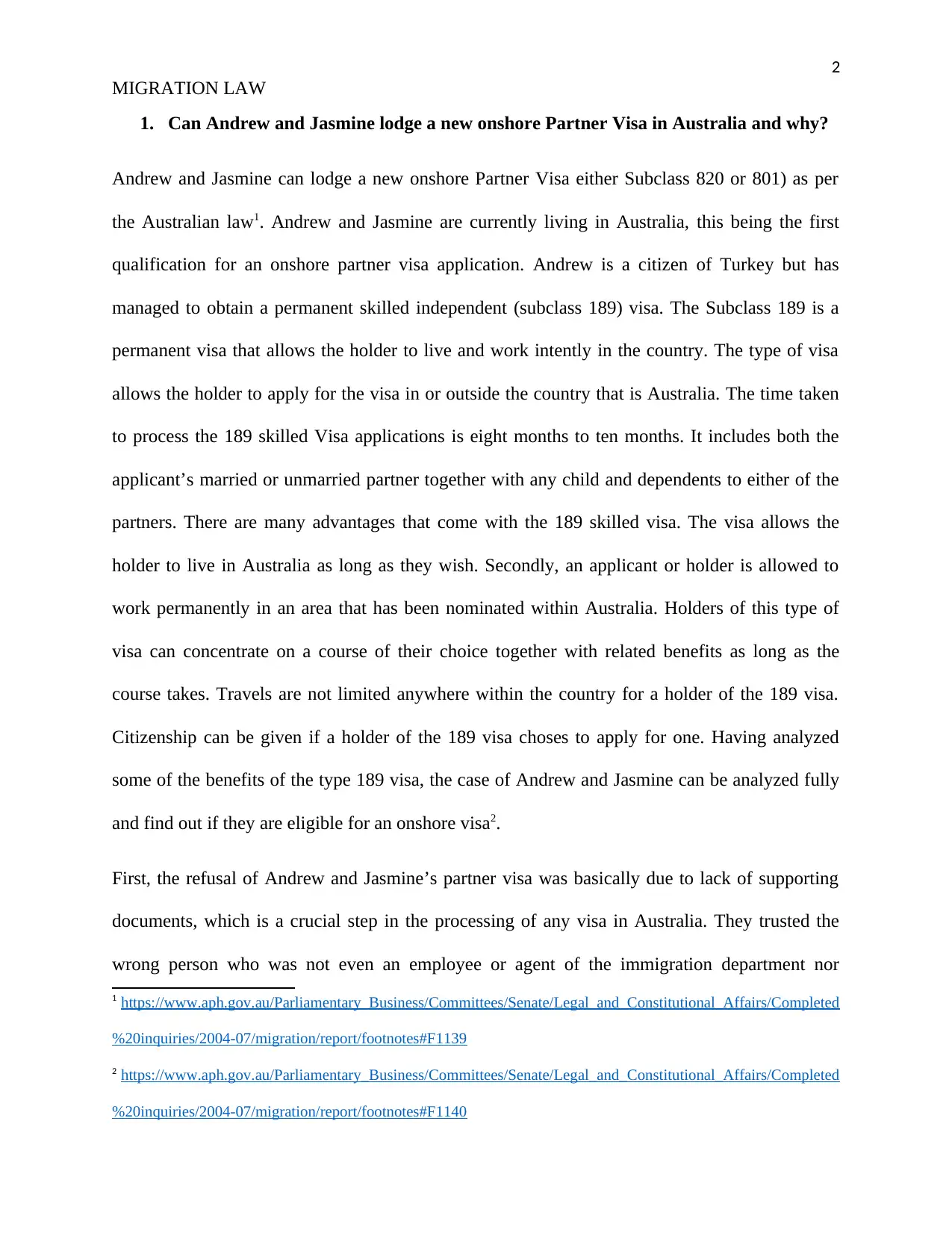
2
MIGRATION LAW
1. Can Andrew and Jasmine lodge a new onshore Partner Visa in Australia and why?
Andrew and Jasmine can lodge a new onshore Partner Visa either Subclass 820 or 801) as per
the Australian law1. Andrew and Jasmine are currently living in Australia, this being the first
qualification for an onshore partner visa application. Andrew is a citizen of Turkey but has
managed to obtain a permanent skilled independent (subclass 189) visa. The Subclass 189 is a
permanent visa that allows the holder to live and work intently in the country. The type of visa
allows the holder to apply for the visa in or outside the country that is Australia. The time taken
to process the 189 skilled Visa applications is eight months to ten months. It includes both the
applicant’s married or unmarried partner together with any child and dependents to either of the
partners. There are many advantages that come with the 189 skilled visa. The visa allows the
holder to live in Australia as long as they wish. Secondly, an applicant or holder is allowed to
work permanently in an area that has been nominated within Australia. Holders of this type of
visa can concentrate on a course of their choice together with related benefits as long as the
course takes. Travels are not limited anywhere within the country for a holder of the 189 visa.
Citizenship can be given if a holder of the 189 visa choses to apply for one. Having analyzed
some of the benefits of the type 189 visa, the case of Andrew and Jasmine can be analyzed fully
and find out if they are eligible for an onshore visa2.
First, the refusal of Andrew and Jasmine’s partner visa was basically due to lack of supporting
documents, which is a crucial step in the processing of any visa in Australia. They trusted the
wrong person who was not even an employee or agent of the immigration department nor
1 https://www.aph.gov.au/Parliamentary_Business/Committees/Senate/Legal_and_Constitutional_Affairs/Completed
%20inquiries/2004-07/migration/report/footnotes#F1139
2 https://www.aph.gov.au/Parliamentary_Business/Committees/Senate/Legal_and_Constitutional_Affairs/Completed
%20inquiries/2004-07/migration/report/footnotes#F1140
MIGRATION LAW
1. Can Andrew and Jasmine lodge a new onshore Partner Visa in Australia and why?
Andrew and Jasmine can lodge a new onshore Partner Visa either Subclass 820 or 801) as per
the Australian law1. Andrew and Jasmine are currently living in Australia, this being the first
qualification for an onshore partner visa application. Andrew is a citizen of Turkey but has
managed to obtain a permanent skilled independent (subclass 189) visa. The Subclass 189 is a
permanent visa that allows the holder to live and work intently in the country. The type of visa
allows the holder to apply for the visa in or outside the country that is Australia. The time taken
to process the 189 skilled Visa applications is eight months to ten months. It includes both the
applicant’s married or unmarried partner together with any child and dependents to either of the
partners. There are many advantages that come with the 189 skilled visa. The visa allows the
holder to live in Australia as long as they wish. Secondly, an applicant or holder is allowed to
work permanently in an area that has been nominated within Australia. Holders of this type of
visa can concentrate on a course of their choice together with related benefits as long as the
course takes. Travels are not limited anywhere within the country for a holder of the 189 visa.
Citizenship can be given if a holder of the 189 visa choses to apply for one. Having analyzed
some of the benefits of the type 189 visa, the case of Andrew and Jasmine can be analyzed fully
and find out if they are eligible for an onshore visa2.
First, the refusal of Andrew and Jasmine’s partner visa was basically due to lack of supporting
documents, which is a crucial step in the processing of any visa in Australia. They trusted the
wrong person who was not even an employee or agent of the immigration department nor
1 https://www.aph.gov.au/Parliamentary_Business/Committees/Senate/Legal_and_Constitutional_Affairs/Completed
%20inquiries/2004-07/migration/report/footnotes#F1139
2 https://www.aph.gov.au/Parliamentary_Business/Committees/Senate/Legal_and_Constitutional_Affairs/Completed
%20inquiries/2004-07/migration/report/footnotes#F1140
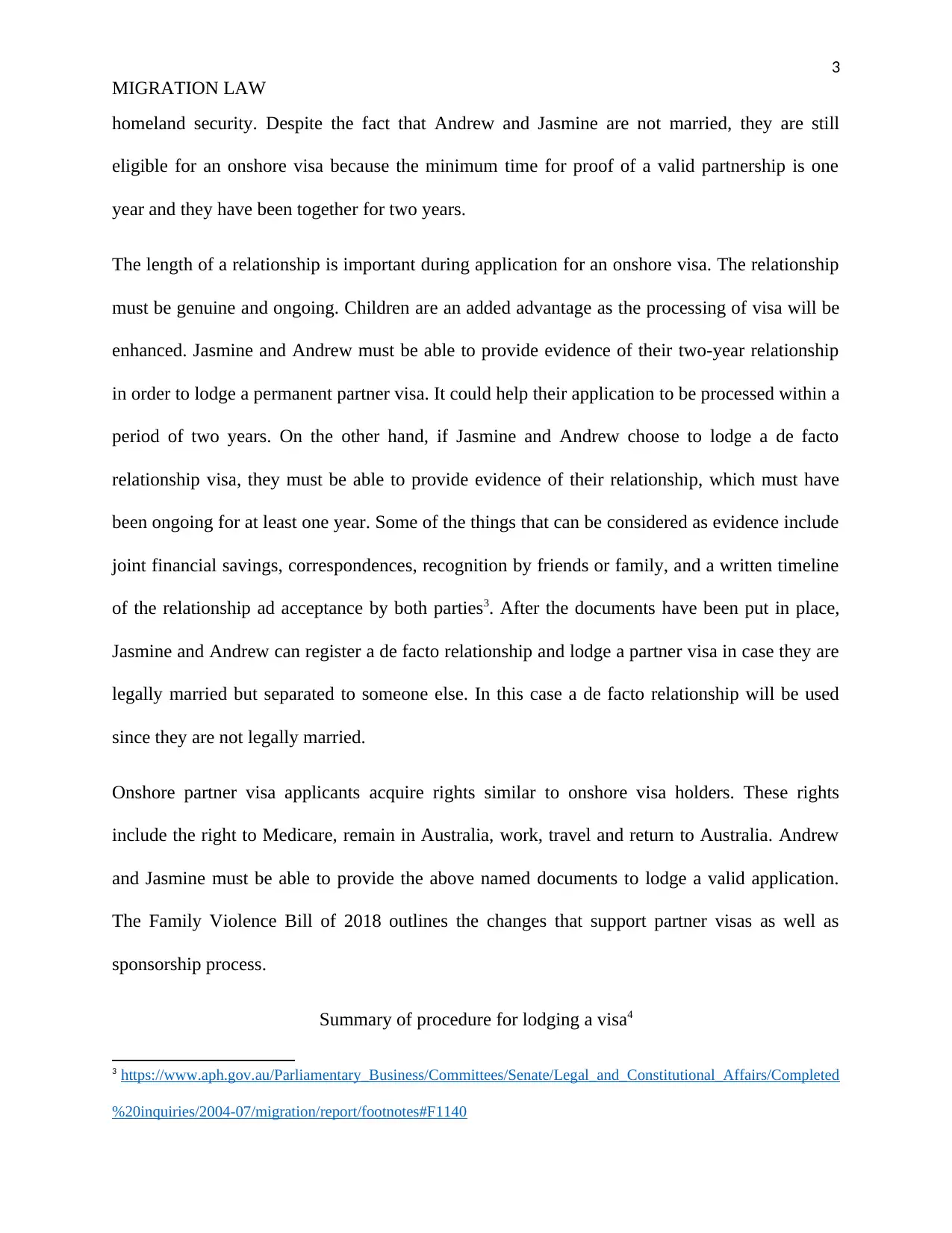
3
MIGRATION LAW
homeland security. Despite the fact that Andrew and Jasmine are not married, they are still
eligible for an onshore visa because the minimum time for proof of a valid partnership is one
year and they have been together for two years.
The length of a relationship is important during application for an onshore visa. The relationship
must be genuine and ongoing. Children are an added advantage as the processing of visa will be
enhanced. Jasmine and Andrew must be able to provide evidence of their two-year relationship
in order to lodge a permanent partner visa. It could help their application to be processed within a
period of two years. On the other hand, if Jasmine and Andrew choose to lodge a de facto
relationship visa, they must be able to provide evidence of their relationship, which must have
been ongoing for at least one year. Some of the things that can be considered as evidence include
joint financial savings, correspondences, recognition by friends or family, and a written timeline
of the relationship ad acceptance by both parties3. After the documents have been put in place,
Jasmine and Andrew can register a de facto relationship and lodge a partner visa in case they are
legally married but separated to someone else. In this case a de facto relationship will be used
since they are not legally married.
Onshore partner visa applicants acquire rights similar to onshore visa holders. These rights
include the right to Medicare, remain in Australia, work, travel and return to Australia. Andrew
and Jasmine must be able to provide the above named documents to lodge a valid application.
The Family Violence Bill of 2018 outlines the changes that support partner visas as well as
sponsorship process.
Summary of procedure for lodging a visa4
3 https://www.aph.gov.au/Parliamentary_Business/Committees/Senate/Legal_and_Constitutional_Affairs/Completed
%20inquiries/2004-07/migration/report/footnotes#F1140
MIGRATION LAW
homeland security. Despite the fact that Andrew and Jasmine are not married, they are still
eligible for an onshore visa because the minimum time for proof of a valid partnership is one
year and they have been together for two years.
The length of a relationship is important during application for an onshore visa. The relationship
must be genuine and ongoing. Children are an added advantage as the processing of visa will be
enhanced. Jasmine and Andrew must be able to provide evidence of their two-year relationship
in order to lodge a permanent partner visa. It could help their application to be processed within a
period of two years. On the other hand, if Jasmine and Andrew choose to lodge a de facto
relationship visa, they must be able to provide evidence of their relationship, which must have
been ongoing for at least one year. Some of the things that can be considered as evidence include
joint financial savings, correspondences, recognition by friends or family, and a written timeline
of the relationship ad acceptance by both parties3. After the documents have been put in place,
Jasmine and Andrew can register a de facto relationship and lodge a partner visa in case they are
legally married but separated to someone else. In this case a de facto relationship will be used
since they are not legally married.
Onshore partner visa applicants acquire rights similar to onshore visa holders. These rights
include the right to Medicare, remain in Australia, work, travel and return to Australia. Andrew
and Jasmine must be able to provide the above named documents to lodge a valid application.
The Family Violence Bill of 2018 outlines the changes that support partner visas as well as
sponsorship process.
Summary of procedure for lodging a visa4
3 https://www.aph.gov.au/Parliamentary_Business/Committees/Senate/Legal_and_Constitutional_Affairs/Completed
%20inquiries/2004-07/migration/report/footnotes#F1140
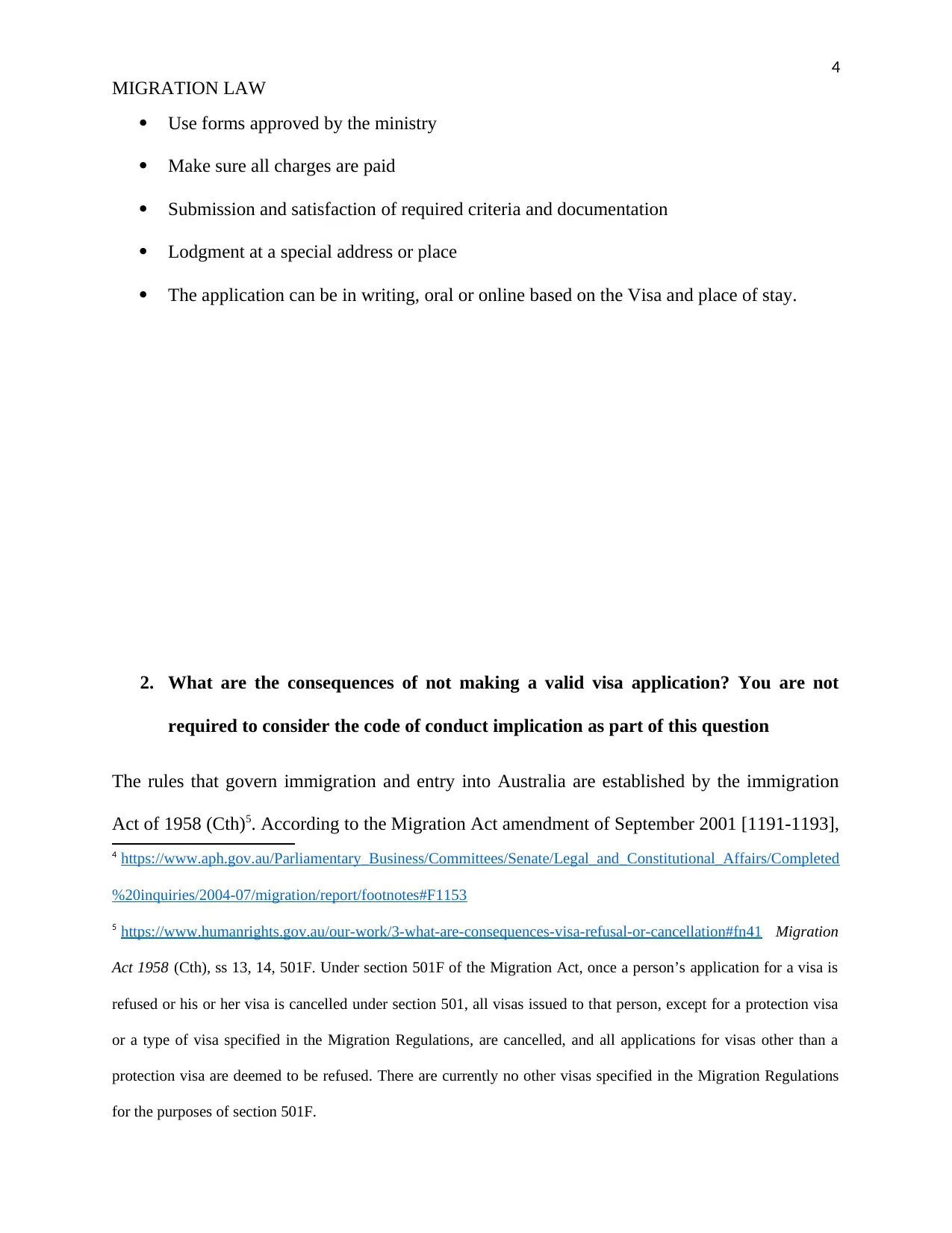
4
MIGRATION LAW
Use forms approved by the ministry
Make sure all charges are paid
Submission and satisfaction of required criteria and documentation
Lodgment at a special address or place
The application can be in writing, oral or online based on the Visa and place of stay.
2. What are the consequences of not making a valid visa application? You are not
required to consider the code of conduct implication as part of this question
The rules that govern immigration and entry into Australia are established by the immigration
Act of 1958 (Cth)5. According to the Migration Act amendment of September 2001 [1191-1193],
4 https://www.aph.gov.au/Parliamentary_Business/Committees/Senate/Legal_and_Constitutional_Affairs/Completed
%20inquiries/2004-07/migration/report/footnotes#F1153
5 https://www.humanrights.gov.au/our-work/3-what-are-consequences-visa-refusal-or-cancellation#fn41 Migration
Act 1958 (Cth), ss 13, 14, 501F. Under section 501F of the Migration Act, once a person’s application for a visa is
refused or his or her visa is cancelled under section 501, all visas issued to that person, except for a protection visa
or a type of visa specified in the Migration Regulations, are cancelled, and all applications for visas other than a
protection visa are deemed to be refused. There are currently no other visas specified in the Migration Regulations
for the purposes of section 501F.
MIGRATION LAW
Use forms approved by the ministry
Make sure all charges are paid
Submission and satisfaction of required criteria and documentation
Lodgment at a special address or place
The application can be in writing, oral or online based on the Visa and place of stay.
2. What are the consequences of not making a valid visa application? You are not
required to consider the code of conduct implication as part of this question
The rules that govern immigration and entry into Australia are established by the immigration
Act of 1958 (Cth)5. According to the Migration Act amendment of September 2001 [1191-1193],
4 https://www.aph.gov.au/Parliamentary_Business/Committees/Senate/Legal_and_Constitutional_Affairs/Completed
%20inquiries/2004-07/migration/report/footnotes#F1153
5 https://www.humanrights.gov.au/our-work/3-what-are-consequences-visa-refusal-or-cancellation#fn41 Migration
Act 1958 (Cth), ss 13, 14, 501F. Under section 501F of the Migration Act, once a person’s application for a visa is
refused or his or her visa is cancelled under section 501, all visas issued to that person, except for a protection visa
or a type of visa specified in the Migration Regulations, are cancelled, and all applications for visas other than a
protection visa are deemed to be refused. There are currently no other visas specified in the Migration Regulations
for the purposes of section 501F.
Secure Best Marks with AI Grader
Need help grading? Try our AI Grader for instant feedback on your assignments.
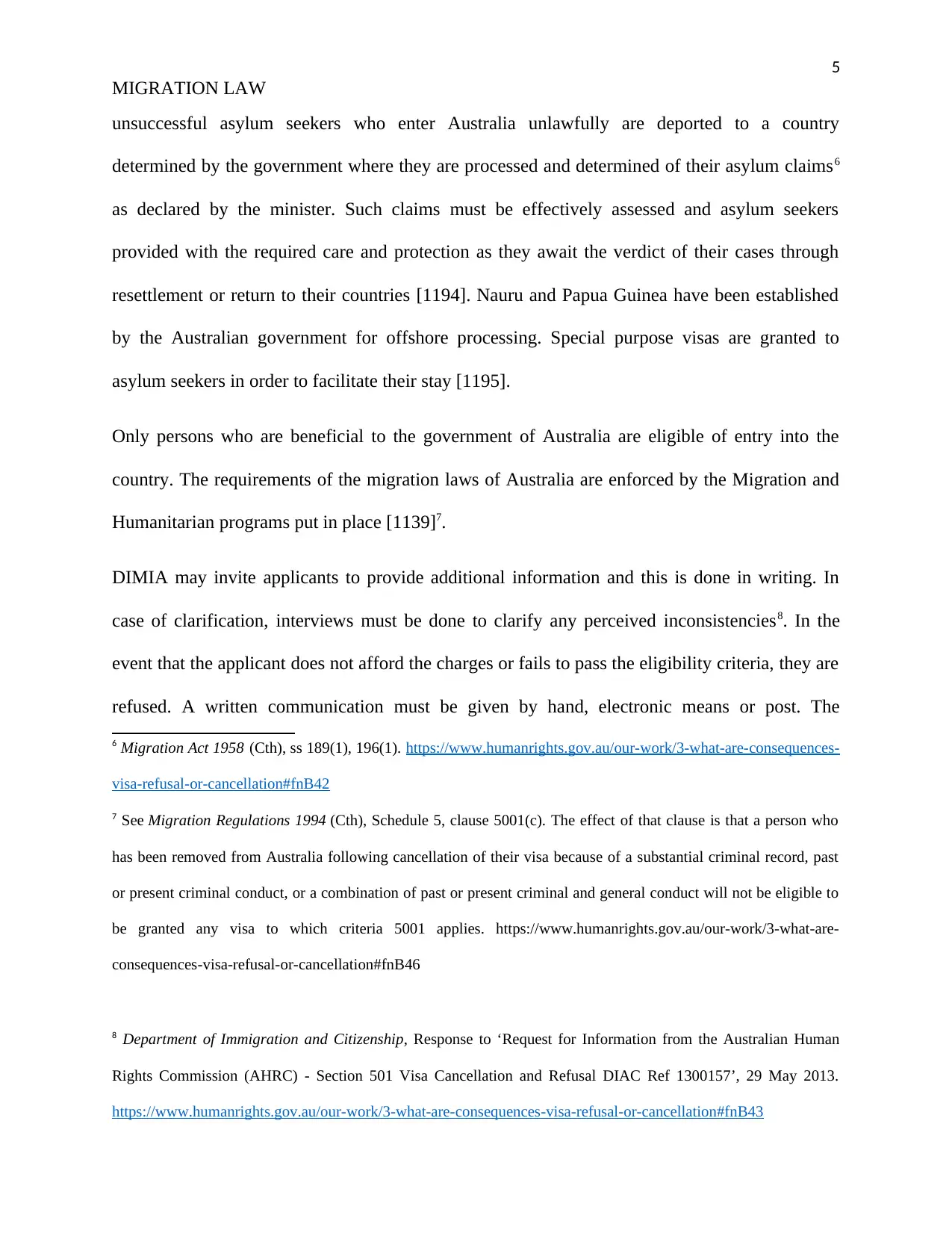
5
MIGRATION LAW
unsuccessful asylum seekers who enter Australia unlawfully are deported to a country
determined by the government where they are processed and determined of their asylum claims6
as declared by the minister. Such claims must be effectively assessed and asylum seekers
provided with the required care and protection as they await the verdict of their cases through
resettlement or return to their countries [1194]. Nauru and Papua Guinea have been established
by the Australian government for offshore processing. Special purpose visas are granted to
asylum seekers in order to facilitate their stay [1195].
Only persons who are beneficial to the government of Australia are eligible of entry into the
country. The requirements of the migration laws of Australia are enforced by the Migration and
Humanitarian programs put in place [1139]7.
DIMIA may invite applicants to provide additional information and this is done in writing. In
case of clarification, interviews must be done to clarify any perceived inconsistencies8. In the
event that the applicant does not afford the charges or fails to pass the eligibility criteria, they are
refused. A written communication must be given by hand, electronic means or post. The
6 Migration Act 1958 (Cth), ss 189(1), 196(1). https://www.humanrights.gov.au/our-work/3-what-are-consequences-
visa-refusal-or-cancellation#fnB42
7 See Migration Regulations 1994 (Cth), Schedule 5, clause 5001(c). The effect of that clause is that a person who
has been removed from Australia following cancellation of their visa because of a substantial criminal record, past
or present criminal conduct, or a combination of past or present criminal and general conduct will not be eligible to
be granted any visa to which criteria 5001 applies. https://www.humanrights.gov.au/our-work/3-what-are-
consequences-visa-refusal-or-cancellation#fnB46
8 Department of Immigration and Citizenship, Response to ‘Request for Information from the Australian Human
Rights Commission (AHRC) - Section 501 Visa Cancellation and Refusal DIAC Ref 1300157’, 29 May 2013.
https://www.humanrights.gov.au/our-work/3-what-are-consequences-visa-refusal-or-cancellation#fnB43
MIGRATION LAW
unsuccessful asylum seekers who enter Australia unlawfully are deported to a country
determined by the government where they are processed and determined of their asylum claims6
as declared by the minister. Such claims must be effectively assessed and asylum seekers
provided with the required care and protection as they await the verdict of their cases through
resettlement or return to their countries [1194]. Nauru and Papua Guinea have been established
by the Australian government for offshore processing. Special purpose visas are granted to
asylum seekers in order to facilitate their stay [1195].
Only persons who are beneficial to the government of Australia are eligible of entry into the
country. The requirements of the migration laws of Australia are enforced by the Migration and
Humanitarian programs put in place [1139]7.
DIMIA may invite applicants to provide additional information and this is done in writing. In
case of clarification, interviews must be done to clarify any perceived inconsistencies8. In the
event that the applicant does not afford the charges or fails to pass the eligibility criteria, they are
refused. A written communication must be given by hand, electronic means or post. The
6 Migration Act 1958 (Cth), ss 189(1), 196(1). https://www.humanrights.gov.au/our-work/3-what-are-consequences-
visa-refusal-or-cancellation#fnB42
7 See Migration Regulations 1994 (Cth), Schedule 5, clause 5001(c). The effect of that clause is that a person who
has been removed from Australia following cancellation of their visa because of a substantial criminal record, past
or present criminal conduct, or a combination of past or present criminal and general conduct will not be eligible to
be granted any visa to which criteria 5001 applies. https://www.humanrights.gov.au/our-work/3-what-are-
consequences-visa-refusal-or-cancellation#fnB46
8 Department of Immigration and Citizenship, Response to ‘Request for Information from the Australian Human
Rights Commission (AHRC) - Section 501 Visa Cancellation and Refusal DIAC Ref 1300157’, 29 May 2013.
https://www.humanrights.gov.au/our-work/3-what-are-consequences-visa-refusal-or-cancellation#fnB43
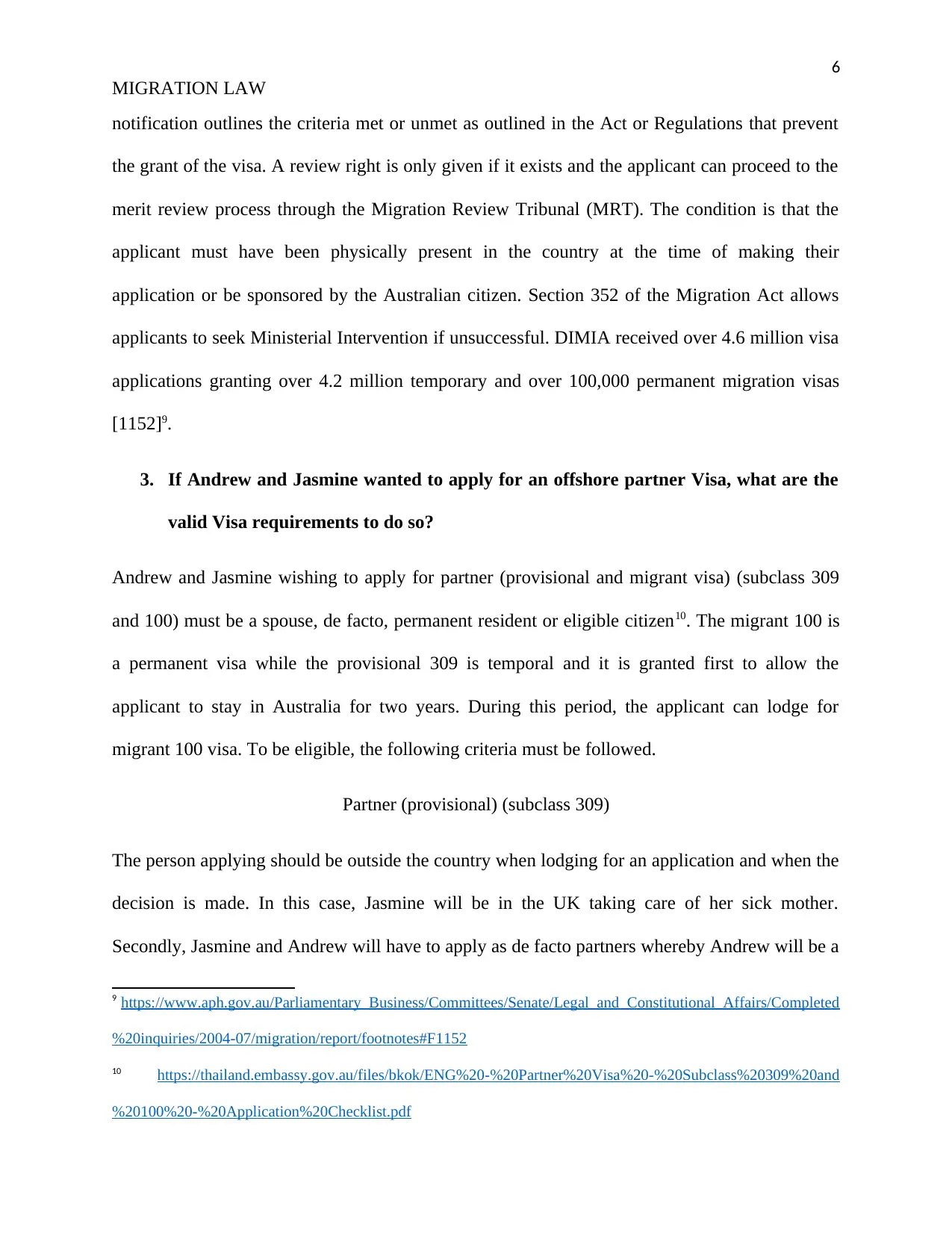
6
MIGRATION LAW
notification outlines the criteria met or unmet as outlined in the Act or Regulations that prevent
the grant of the visa. A review right is only given if it exists and the applicant can proceed to the
merit review process through the Migration Review Tribunal (MRT). The condition is that the
applicant must have been physically present in the country at the time of making their
application or be sponsored by the Australian citizen. Section 352 of the Migration Act allows
applicants to seek Ministerial Intervention if unsuccessful. DIMIA received over 4.6 million visa
applications granting over 4.2 million temporary and over 100,000 permanent migration visas
[1152]9.
3. If Andrew and Jasmine wanted to apply for an offshore partner Visa, what are the
valid Visa requirements to do so?
Andrew and Jasmine wishing to apply for partner (provisional and migrant visa) (subclass 309
and 100) must be a spouse, de facto, permanent resident or eligible citizen10. The migrant 100 is
a permanent visa while the provisional 309 is temporal and it is granted first to allow the
applicant to stay in Australia for two years. During this period, the applicant can lodge for
migrant 100 visa. To be eligible, the following criteria must be followed.
Partner (provisional) (subclass 309)
The person applying should be outside the country when lodging for an application and when the
decision is made. In this case, Jasmine will be in the UK taking care of her sick mother.
Secondly, Jasmine and Andrew will have to apply as de facto partners whereby Andrew will be a
9 https://www.aph.gov.au/Parliamentary_Business/Committees/Senate/Legal_and_Constitutional_Affairs/Completed
%20inquiries/2004-07/migration/report/footnotes#F1152
10 https://thailand.embassy.gov.au/files/bkok/ENG%20-%20Partner%20Visa%20-%20Subclass%20309%20and
%20100%20-%20Application%20Checklist.pdf
MIGRATION LAW
notification outlines the criteria met or unmet as outlined in the Act or Regulations that prevent
the grant of the visa. A review right is only given if it exists and the applicant can proceed to the
merit review process through the Migration Review Tribunal (MRT). The condition is that the
applicant must have been physically present in the country at the time of making their
application or be sponsored by the Australian citizen. Section 352 of the Migration Act allows
applicants to seek Ministerial Intervention if unsuccessful. DIMIA received over 4.6 million visa
applications granting over 4.2 million temporary and over 100,000 permanent migration visas
[1152]9.
3. If Andrew and Jasmine wanted to apply for an offshore partner Visa, what are the
valid Visa requirements to do so?
Andrew and Jasmine wishing to apply for partner (provisional and migrant visa) (subclass 309
and 100) must be a spouse, de facto, permanent resident or eligible citizen10. The migrant 100 is
a permanent visa while the provisional 309 is temporal and it is granted first to allow the
applicant to stay in Australia for two years. During this period, the applicant can lodge for
migrant 100 visa. To be eligible, the following criteria must be followed.
Partner (provisional) (subclass 309)
The person applying should be outside the country when lodging for an application and when the
decision is made. In this case, Jasmine will be in the UK taking care of her sick mother.
Secondly, Jasmine and Andrew will have to apply as de facto partners whereby Andrew will be a
9 https://www.aph.gov.au/Parliamentary_Business/Committees/Senate/Legal_and_Constitutional_Affairs/Completed
%20inquiries/2004-07/migration/report/footnotes#F1152
10 https://thailand.embassy.gov.au/files/bkok/ENG%20-%20Partner%20Visa%20-%20Subclass%20309%20and
%20100%20-%20Application%20Checklist.pdf
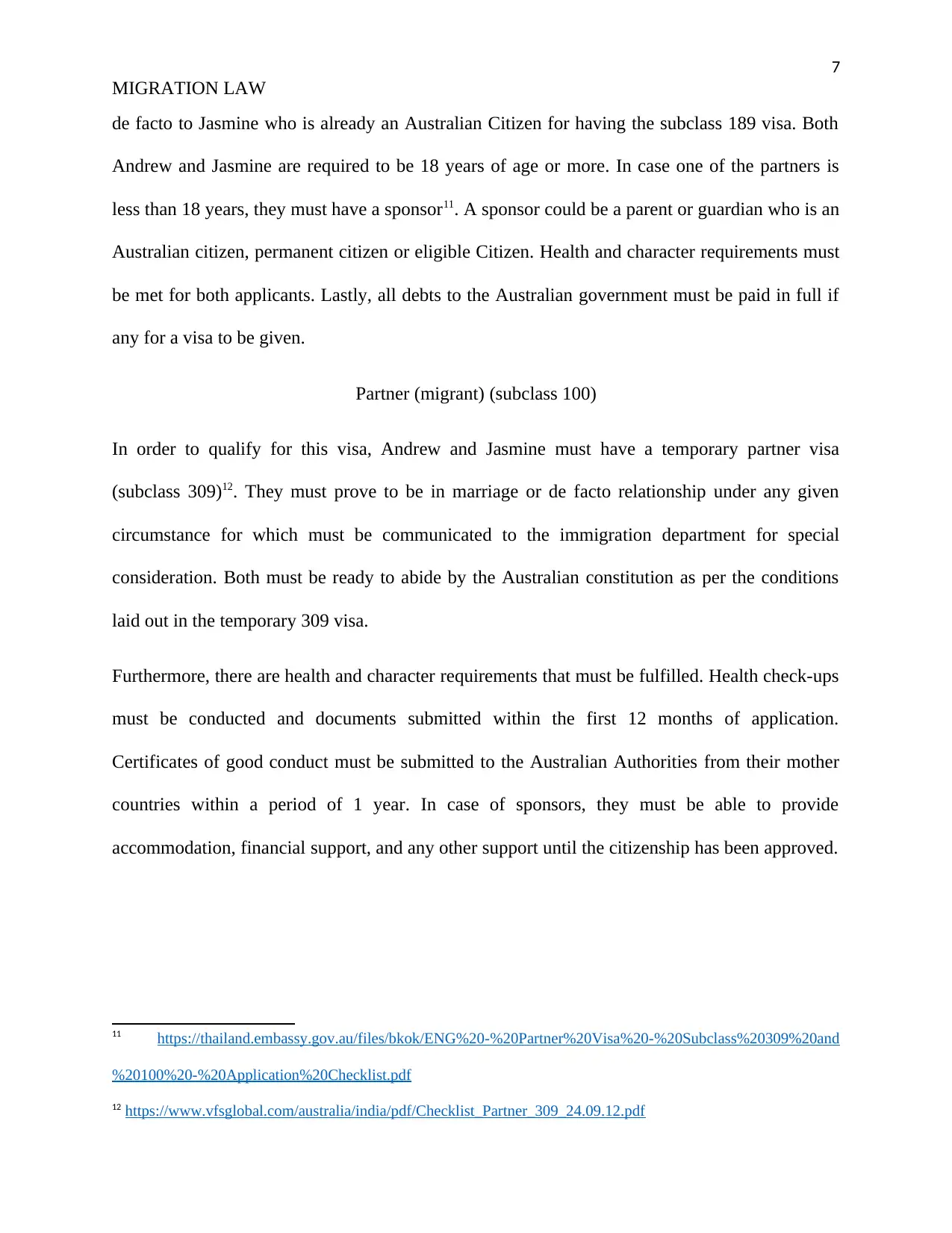
7
MIGRATION LAW
de facto to Jasmine who is already an Australian Citizen for having the subclass 189 visa. Both
Andrew and Jasmine are required to be 18 years of age or more. In case one of the partners is
less than 18 years, they must have a sponsor11. A sponsor could be a parent or guardian who is an
Australian citizen, permanent citizen or eligible Citizen. Health and character requirements must
be met for both applicants. Lastly, all debts to the Australian government must be paid in full if
any for a visa to be given.
Partner (migrant) (subclass 100)
In order to qualify for this visa, Andrew and Jasmine must have a temporary partner visa
(subclass 309)12. They must prove to be in marriage or de facto relationship under any given
circumstance for which must be communicated to the immigration department for special
consideration. Both must be ready to abide by the Australian constitution as per the conditions
laid out in the temporary 309 visa.
Furthermore, there are health and character requirements that must be fulfilled. Health check-ups
must be conducted and documents submitted within the first 12 months of application.
Certificates of good conduct must be submitted to the Australian Authorities from their mother
countries within a period of 1 year. In case of sponsors, they must be able to provide
accommodation, financial support, and any other support until the citizenship has been approved.
11 https://thailand.embassy.gov.au/files/bkok/ENG%20-%20Partner%20Visa%20-%20Subclass%20309%20and
%20100%20-%20Application%20Checklist.pdf
12 https://www.vfsglobal.com/australia/india/pdf/Checklist_Partner_309_24.09.12.pdf
MIGRATION LAW
de facto to Jasmine who is already an Australian Citizen for having the subclass 189 visa. Both
Andrew and Jasmine are required to be 18 years of age or more. In case one of the partners is
less than 18 years, they must have a sponsor11. A sponsor could be a parent or guardian who is an
Australian citizen, permanent citizen or eligible Citizen. Health and character requirements must
be met for both applicants. Lastly, all debts to the Australian government must be paid in full if
any for a visa to be given.
Partner (migrant) (subclass 100)
In order to qualify for this visa, Andrew and Jasmine must have a temporary partner visa
(subclass 309)12. They must prove to be in marriage or de facto relationship under any given
circumstance for which must be communicated to the immigration department for special
consideration. Both must be ready to abide by the Australian constitution as per the conditions
laid out in the temporary 309 visa.
Furthermore, there are health and character requirements that must be fulfilled. Health check-ups
must be conducted and documents submitted within the first 12 months of application.
Certificates of good conduct must be submitted to the Australian Authorities from their mother
countries within a period of 1 year. In case of sponsors, they must be able to provide
accommodation, financial support, and any other support until the citizenship has been approved.
11 https://thailand.embassy.gov.au/files/bkok/ENG%20-%20Partner%20Visa%20-%20Subclass%20309%20and
%20100%20-%20Application%20Checklist.pdf
12 https://www.vfsglobal.com/australia/india/pdf/Checklist_Partner_309_24.09.12.pdf
Paraphrase This Document
Need a fresh take? Get an instant paraphrase of this document with our AI Paraphraser
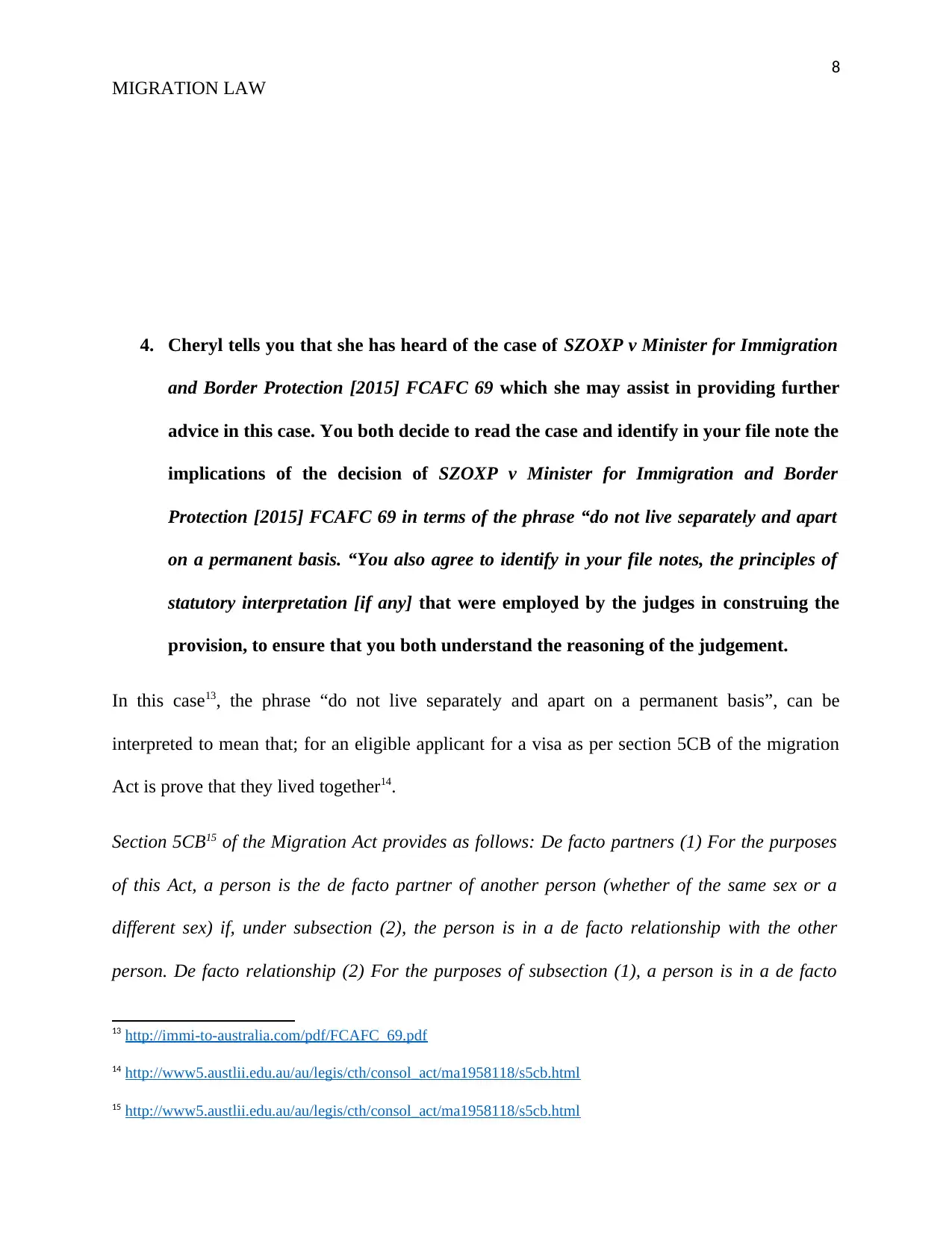
8
MIGRATION LAW
4. Cheryl tells you that she has heard of the case of SZOXP v Minister for Immigration
and Border Protection [2015] FCAFC 69 which she may assist in providing further
advice in this case. You both decide to read the case and identify in your file note the
implications of the decision of SZOXP v Minister for Immigration and Border
Protection [2015] FCAFC 69 in terms of the phrase “do not live separately and apart
on a permanent basis. “You also agree to identify in your file notes, the principles of
statutory interpretation [if any] that were employed by the judges in construing the
provision, to ensure that you both understand the reasoning of the judgement.
In this case13, the phrase “do not live separately and apart on a permanent basis”, can be
interpreted to mean that; for an eligible applicant for a visa as per section 5CB of the migration
Act is prove that they lived together14.
Section 5CB15 of the Migration Act provides as follows: De facto partners (1) For the purposes
of this Act, a person is the de facto partner of another person (whether of the same sex or a
different sex) if, under subsection (2), the person is in a de facto relationship with the other
person. De facto relationship (2) For the purposes of subsection (1), a person is in a de facto
13 http://immi-to-australia.com/pdf/FCAFC_69.pdf
14 http://www5.austlii.edu.au/au/legis/cth/consol_act/ma1958118/s5cb.html
15 http://www5.austlii.edu.au/au/legis/cth/consol_act/ma1958118/s5cb.html
MIGRATION LAW
4. Cheryl tells you that she has heard of the case of SZOXP v Minister for Immigration
and Border Protection [2015] FCAFC 69 which she may assist in providing further
advice in this case. You both decide to read the case and identify in your file note the
implications of the decision of SZOXP v Minister for Immigration and Border
Protection [2015] FCAFC 69 in terms of the phrase “do not live separately and apart
on a permanent basis. “You also agree to identify in your file notes, the principles of
statutory interpretation [if any] that were employed by the judges in construing the
provision, to ensure that you both understand the reasoning of the judgement.
In this case13, the phrase “do not live separately and apart on a permanent basis”, can be
interpreted to mean that; for an eligible applicant for a visa as per section 5CB of the migration
Act is prove that they lived together14.
Section 5CB15 of the Migration Act provides as follows: De facto partners (1) For the purposes
of this Act, a person is the de facto partner of another person (whether of the same sex or a
different sex) if, under subsection (2), the person is in a de facto relationship with the other
person. De facto relationship (2) For the purposes of subsection (1), a person is in a de facto
13 http://immi-to-australia.com/pdf/FCAFC_69.pdf
14 http://www5.austlii.edu.au/au/legis/cth/consol_act/ma1958118/s5cb.html
15 http://www5.austlii.edu.au/au/legis/cth/consol_act/ma1958118/s5cb.html
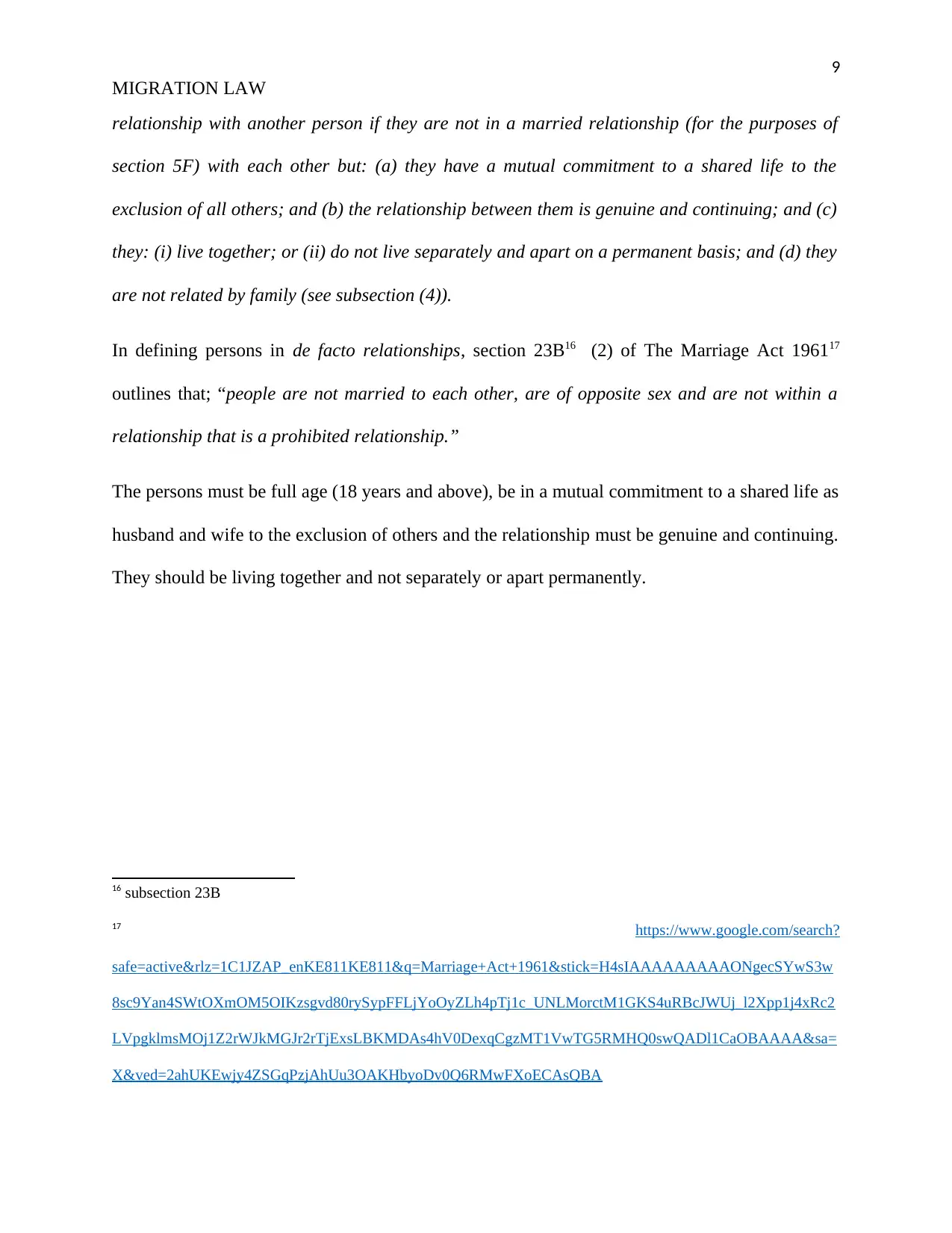
9
MIGRATION LAW
relationship with another person if they are not in a married relationship (for the purposes of
section 5F) with each other but: (a) they have a mutual commitment to a shared life to the
exclusion of all others; and (b) the relationship between them is genuine and continuing; and (c)
they: (i) live together; or (ii) do not live separately and apart on a permanent basis; and (d) they
are not related by family (see subsection (4)).
In defining persons in de facto relationships, section 23B16 (2) of The Marriage Act 196117
outlines that; “people are not married to each other, are of opposite sex and are not within a
relationship that is a prohibited relationship.”
The persons must be full age (18 years and above), be in a mutual commitment to a shared life as
husband and wife to the exclusion of others and the relationship must be genuine and continuing.
They should be living together and not separately or apart permanently.
16 subsection 23B
17 https://www.google.com/search?
safe=active&rlz=1C1JZAP_enKE811KE811&q=Marriage+Act+1961&stick=H4sIAAAAAAAAAONgecSYwS3w
8sc9Yan4SWtOXmOM5OIKzsgvd80rySypFFLjYoOyZLh4pTj1c_UNLMorctM1GKS4uRBcJWUj_l2Xpp1j4xRc2
LVpgklmsMOj1Z2rWJkMGJr2rTjExsLBKMDAs4hV0DexqCgzMT1VwTG5RMHQ0swQADl1CaOBAAAA&sa=
X&ved=2ahUKEwjy4ZSGqPzjAhUu3OAKHbyoDv0Q6RMwFXoECAsQBA
MIGRATION LAW
relationship with another person if they are not in a married relationship (for the purposes of
section 5F) with each other but: (a) they have a mutual commitment to a shared life to the
exclusion of all others; and (b) the relationship between them is genuine and continuing; and (c)
they: (i) live together; or (ii) do not live separately and apart on a permanent basis; and (d) they
are not related by family (see subsection (4)).
In defining persons in de facto relationships, section 23B16 (2) of The Marriage Act 196117
outlines that; “people are not married to each other, are of opposite sex and are not within a
relationship that is a prohibited relationship.”
The persons must be full age (18 years and above), be in a mutual commitment to a shared life as
husband and wife to the exclusion of others and the relationship must be genuine and continuing.
They should be living together and not separately or apart permanently.
16 subsection 23B
17 https://www.google.com/search?
safe=active&rlz=1C1JZAP_enKE811KE811&q=Marriage+Act+1961&stick=H4sIAAAAAAAAAONgecSYwS3w
8sc9Yan4SWtOXmOM5OIKzsgvd80rySypFFLjYoOyZLh4pTj1c_UNLMorctM1GKS4uRBcJWUj_l2Xpp1j4xRc2
LVpgklmsMOj1Z2rWJkMGJr2rTjExsLBKMDAs4hV0DexqCgzMT1VwTG5RMHQ0swQADl1CaOBAAAA&sa=
X&ved=2ahUKEwjy4ZSGqPzjAhUu3OAKHbyoDv0Q6RMwFXoECAsQBA
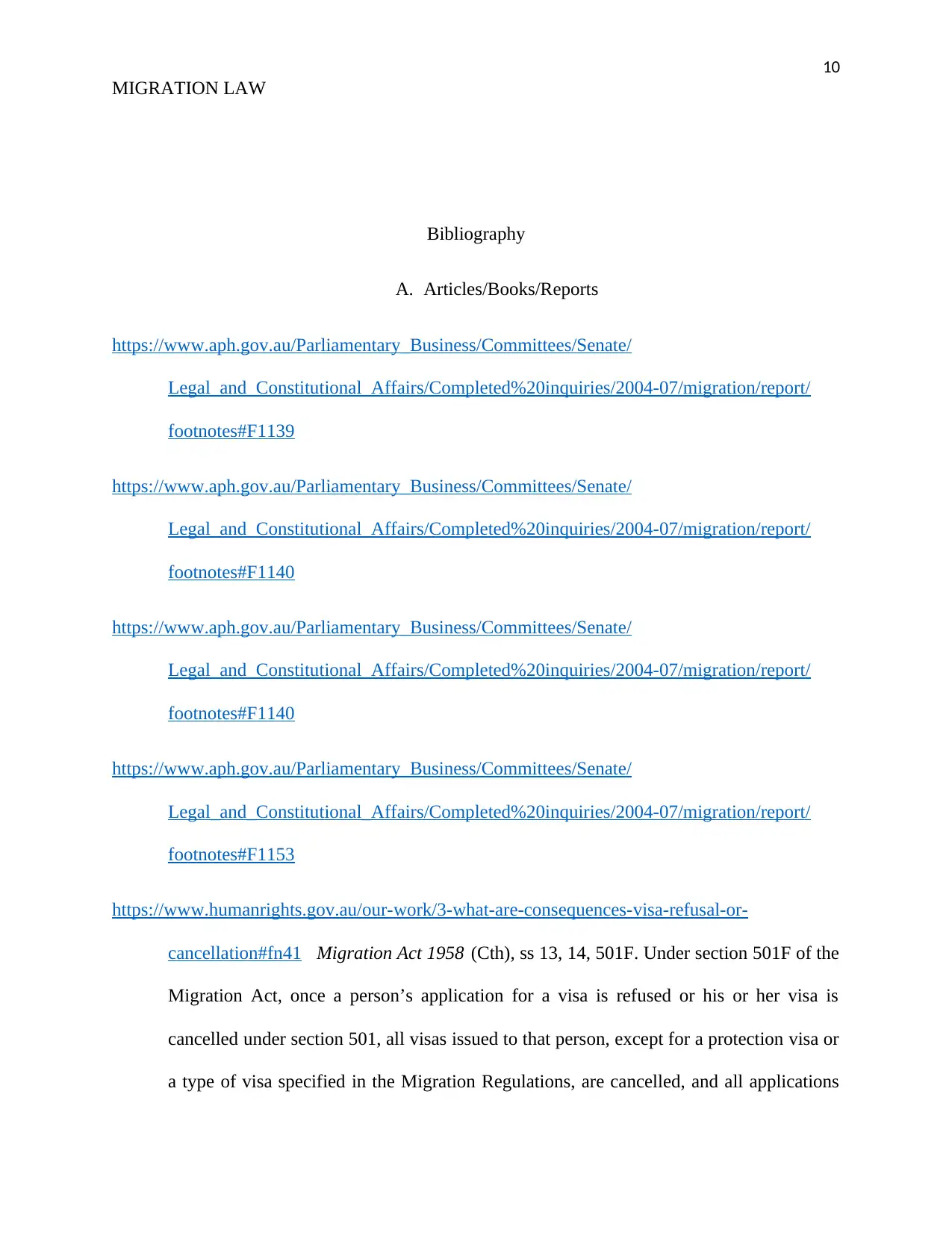
10
MIGRATION LAW
Bibliography
A. Articles/Books/Reports
https://www.aph.gov.au/Parliamentary_Business/Committees/Senate/
Legal_and_Constitutional_Affairs/Completed%20inquiries/2004-07/migration/report/
footnotes#F1139
https://www.aph.gov.au/Parliamentary_Business/Committees/Senate/
Legal_and_Constitutional_Affairs/Completed%20inquiries/2004-07/migration/report/
footnotes#F1140
https://www.aph.gov.au/Parliamentary_Business/Committees/Senate/
Legal_and_Constitutional_Affairs/Completed%20inquiries/2004-07/migration/report/
footnotes#F1140
https://www.aph.gov.au/Parliamentary_Business/Committees/Senate/
Legal_and_Constitutional_Affairs/Completed%20inquiries/2004-07/migration/report/
footnotes#F1153
https://www.humanrights.gov.au/our-work/3-what-are-consequences-visa-refusal-or-
cancellation#fn41 Migration Act 1958 (Cth), ss 13, 14, 501F. Under section 501F of the
Migration Act, once a person’s application for a visa is refused or his or her visa is
cancelled under section 501, all visas issued to that person, except for a protection visa or
a type of visa specified in the Migration Regulations, are cancelled, and all applications
MIGRATION LAW
Bibliography
A. Articles/Books/Reports
https://www.aph.gov.au/Parliamentary_Business/Committees/Senate/
Legal_and_Constitutional_Affairs/Completed%20inquiries/2004-07/migration/report/
footnotes#F1139
https://www.aph.gov.au/Parliamentary_Business/Committees/Senate/
Legal_and_Constitutional_Affairs/Completed%20inquiries/2004-07/migration/report/
footnotes#F1140
https://www.aph.gov.au/Parliamentary_Business/Committees/Senate/
Legal_and_Constitutional_Affairs/Completed%20inquiries/2004-07/migration/report/
footnotes#F1140
https://www.aph.gov.au/Parliamentary_Business/Committees/Senate/
Legal_and_Constitutional_Affairs/Completed%20inquiries/2004-07/migration/report/
footnotes#F1153
https://www.humanrights.gov.au/our-work/3-what-are-consequences-visa-refusal-or-
cancellation#fn41 Migration Act 1958 (Cth), ss 13, 14, 501F. Under section 501F of the
Migration Act, once a person’s application for a visa is refused or his or her visa is
cancelled under section 501, all visas issued to that person, except for a protection visa or
a type of visa specified in the Migration Regulations, are cancelled, and all applications
Secure Best Marks with AI Grader
Need help grading? Try our AI Grader for instant feedback on your assignments.
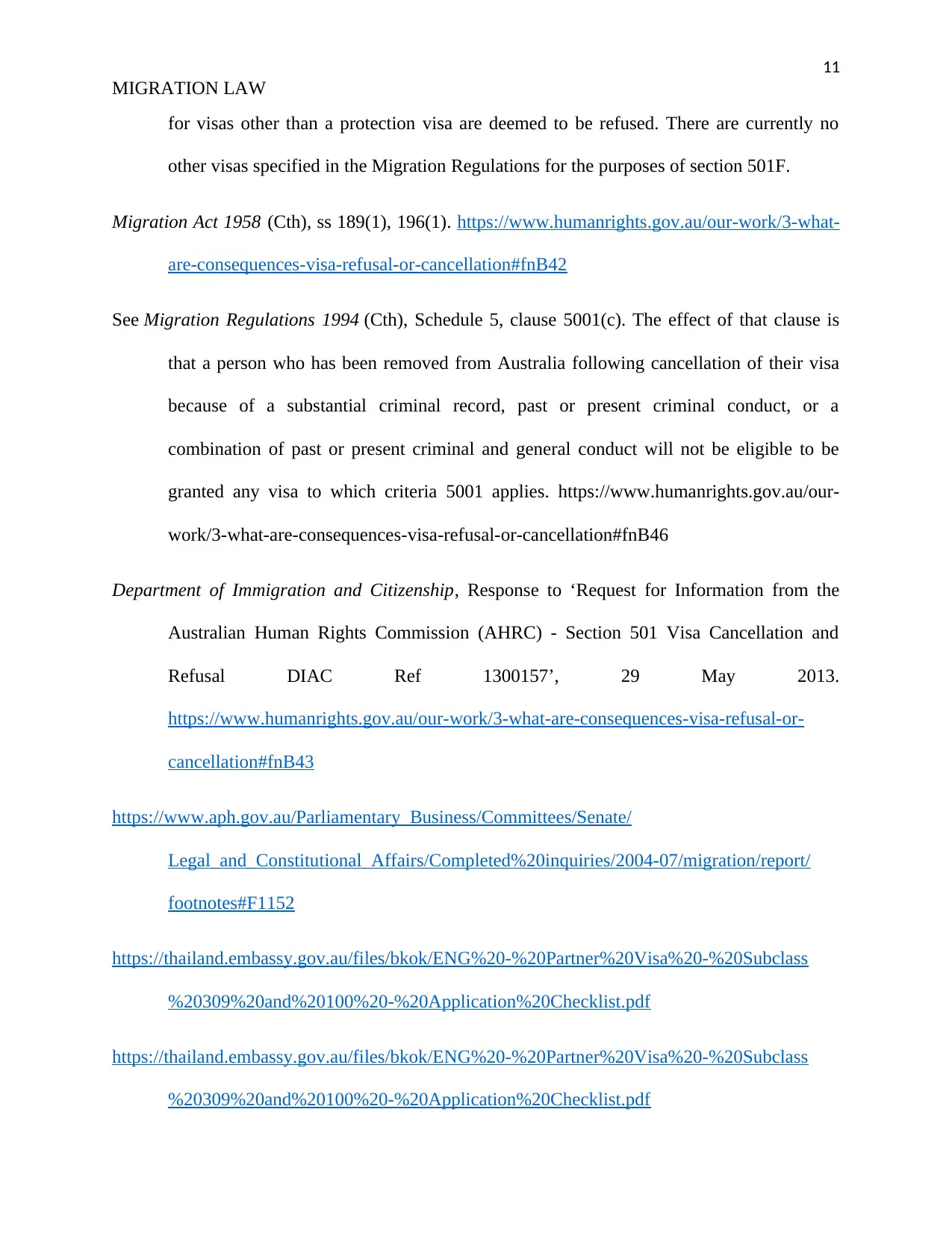
11
MIGRATION LAW
for visas other than a protection visa are deemed to be refused. There are currently no
other visas specified in the Migration Regulations for the purposes of section 501F.
Migration Act 1958 (Cth), ss 189(1), 196(1). https://www.humanrights.gov.au/our-work/3-what-
are-consequences-visa-refusal-or-cancellation#fnB42
See Migration Regulations 1994 (Cth), Schedule 5, clause 5001(c). The effect of that clause is
that a person who has been removed from Australia following cancellation of their visa
because of a substantial criminal record, past or present criminal conduct, or a
combination of past or present criminal and general conduct will not be eligible to be
granted any visa to which criteria 5001 applies. https://www.humanrights.gov.au/our-
work/3-what-are-consequences-visa-refusal-or-cancellation#fnB46
Department of Immigration and Citizenship, Response to ‘Request for Information from the
Australian Human Rights Commission (AHRC) - Section 501 Visa Cancellation and
Refusal DIAC Ref 1300157’, 29 May 2013.
https://www.humanrights.gov.au/our-work/3-what-are-consequences-visa-refusal-or-
cancellation#fnB43
https://www.aph.gov.au/Parliamentary_Business/Committees/Senate/
Legal_and_Constitutional_Affairs/Completed%20inquiries/2004-07/migration/report/
footnotes#F1152
https://thailand.embassy.gov.au/files/bkok/ENG%20-%20Partner%20Visa%20-%20Subclass
%20309%20and%20100%20-%20Application%20Checklist.pdf
https://thailand.embassy.gov.au/files/bkok/ENG%20-%20Partner%20Visa%20-%20Subclass
%20309%20and%20100%20-%20Application%20Checklist.pdf
MIGRATION LAW
for visas other than a protection visa are deemed to be refused. There are currently no
other visas specified in the Migration Regulations for the purposes of section 501F.
Migration Act 1958 (Cth), ss 189(1), 196(1). https://www.humanrights.gov.au/our-work/3-what-
are-consequences-visa-refusal-or-cancellation#fnB42
See Migration Regulations 1994 (Cth), Schedule 5, clause 5001(c). The effect of that clause is
that a person who has been removed from Australia following cancellation of their visa
because of a substantial criminal record, past or present criminal conduct, or a
combination of past or present criminal and general conduct will not be eligible to be
granted any visa to which criteria 5001 applies. https://www.humanrights.gov.au/our-
work/3-what-are-consequences-visa-refusal-or-cancellation#fnB46
Department of Immigration and Citizenship, Response to ‘Request for Information from the
Australian Human Rights Commission (AHRC) - Section 501 Visa Cancellation and
Refusal DIAC Ref 1300157’, 29 May 2013.
https://www.humanrights.gov.au/our-work/3-what-are-consequences-visa-refusal-or-
cancellation#fnB43
https://www.aph.gov.au/Parliamentary_Business/Committees/Senate/
Legal_and_Constitutional_Affairs/Completed%20inquiries/2004-07/migration/report/
footnotes#F1152
https://thailand.embassy.gov.au/files/bkok/ENG%20-%20Partner%20Visa%20-%20Subclass
%20309%20and%20100%20-%20Application%20Checklist.pdf
https://thailand.embassy.gov.au/files/bkok/ENG%20-%20Partner%20Visa%20-%20Subclass
%20309%20and%20100%20-%20Application%20Checklist.pdf
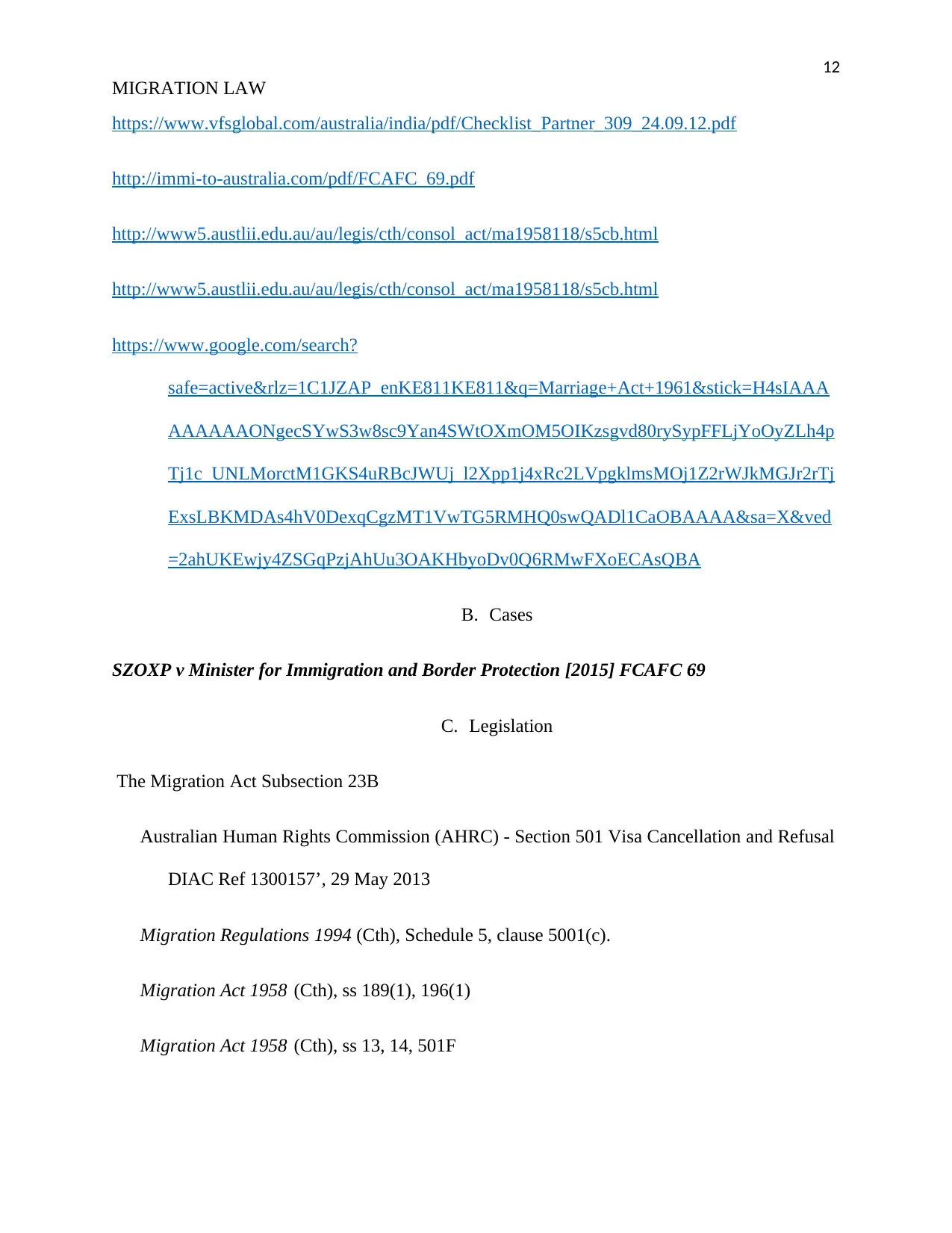
12
MIGRATION LAW
https://www.vfsglobal.com/australia/india/pdf/Checklist_Partner_309_24.09.12.pdf
http://immi-to-australia.com/pdf/FCAFC_69.pdf
http://www5.austlii.edu.au/au/legis/cth/consol_act/ma1958118/s5cb.html
http://www5.austlii.edu.au/au/legis/cth/consol_act/ma1958118/s5cb.html
https://www.google.com/search?
safe=active&rlz=1C1JZAP_enKE811KE811&q=Marriage+Act+1961&stick=H4sIAAA
AAAAAAONgecSYwS3w8sc9Yan4SWtOXmOM5OIKzsgvd80rySypFFLjYoOyZLh4p
Tj1c_UNLMorctM1GKS4uRBcJWUj_l2Xpp1j4xRc2LVpgklmsMOj1Z2rWJkMGJr2rTj
ExsLBKMDAs4hV0DexqCgzMT1VwTG5RMHQ0swQADl1CaOBAAAA&sa=X&ved
=2ahUKEwjy4ZSGqPzjAhUu3OAKHbyoDv0Q6RMwFXoECAsQBA
B. Cases
SZOXP v Minister for Immigration and Border Protection [2015] FCAFC 69
C. Legislation
The Migration Act Subsection 23B
Australian Human Rights Commission (AHRC) - Section 501 Visa Cancellation and Refusal
DIAC Ref 1300157’, 29 May 2013
Migration Regulations 1994 (Cth), Schedule 5, clause 5001(c).
Migration Act 1958 (Cth), ss 189(1), 196(1)
Migration Act 1958 (Cth), ss 13, 14, 501F
MIGRATION LAW
https://www.vfsglobal.com/australia/india/pdf/Checklist_Partner_309_24.09.12.pdf
http://immi-to-australia.com/pdf/FCAFC_69.pdf
http://www5.austlii.edu.au/au/legis/cth/consol_act/ma1958118/s5cb.html
http://www5.austlii.edu.au/au/legis/cth/consol_act/ma1958118/s5cb.html
https://www.google.com/search?
safe=active&rlz=1C1JZAP_enKE811KE811&q=Marriage+Act+1961&stick=H4sIAAA
AAAAAAONgecSYwS3w8sc9Yan4SWtOXmOM5OIKzsgvd80rySypFFLjYoOyZLh4p
Tj1c_UNLMorctM1GKS4uRBcJWUj_l2Xpp1j4xRc2LVpgklmsMOj1Z2rWJkMGJr2rTj
ExsLBKMDAs4hV0DexqCgzMT1VwTG5RMHQ0swQADl1CaOBAAAA&sa=X&ved
=2ahUKEwjy4ZSGqPzjAhUu3OAKHbyoDv0Q6RMwFXoECAsQBA
B. Cases
SZOXP v Minister for Immigration and Border Protection [2015] FCAFC 69
C. Legislation
The Migration Act Subsection 23B
Australian Human Rights Commission (AHRC) - Section 501 Visa Cancellation and Refusal
DIAC Ref 1300157’, 29 May 2013
Migration Regulations 1994 (Cth), Schedule 5, clause 5001(c).
Migration Act 1958 (Cth), ss 189(1), 196(1)
Migration Act 1958 (Cth), ss 13, 14, 501F
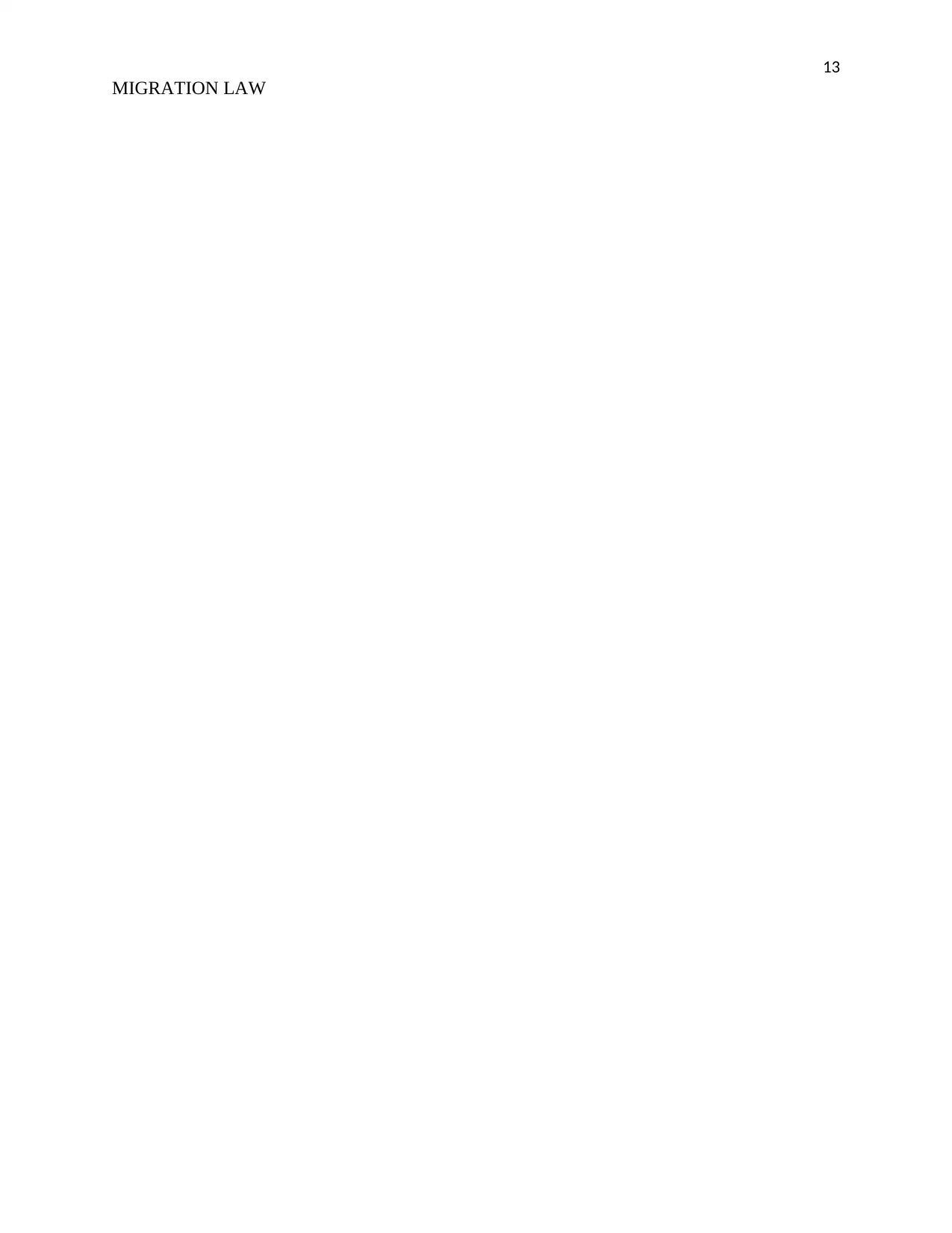
13
MIGRATION LAW
MIGRATION LAW
1 out of 13
Related Documents
Your All-in-One AI-Powered Toolkit for Academic Success.
+13062052269
info@desklib.com
Available 24*7 on WhatsApp / Email
![[object Object]](/_next/static/media/star-bottom.7253800d.svg)
Unlock your academic potential
© 2024 | Zucol Services PVT LTD | All rights reserved.




